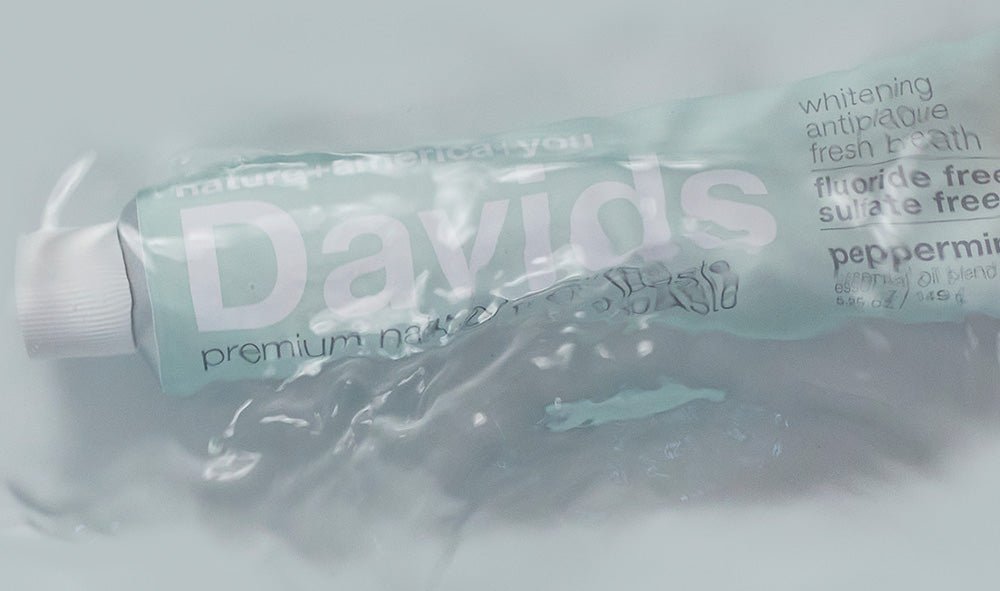You love the cool, fresh feeling you get when you finish your oral care routine with mouthwash. Trust us, we get it.....we love the feeling of an extra clean mouth too.
When paired with regular brushing and flossing....mouthwash can further freshen your breath, whiten your teeth, reduce plaque buildup, prevent cavities and gum disease, and get rid of unwanted particles that brushing and flossing leave behind.
But do these benefits have to come with an intense burn?
The answer is no, they don’t! So let’s uncover some of the reasons why your mouth might be experiencing discomfort from mouthwash...and discover some gentler, natural mouthwash alternatives that suit your needs.
why does mouthwash burn?
The answer to this question has a lot of layers, so let’s peel them back.
irritating ingredients
Conventional mouthwashes contain a lot of harsh chemical ingredients, many of which can lead to an intense burning during + after use. Some of these ingredients include:
- Alcohol: Some cosmetic mouthwashes are 18-25% alcohol. This typically isn’t even enough of a concentration to kill the odor-causing bacteria in your mouth. Rather, the alcohol acts as a vehicle for the other ingredients....and can cause your tongue, cheeks, and gums to burn along the way!
- Hydrogen peroxide: Now you might be wondering...okay, so why does alcohol-free mouthwash burn? Many conventional mouthwashes also contain hydrogen peroxide. While it’s known for its whitening capabilities, studies show that it can cause chemical burning and shouldn’t be used every day in your oral care routine.
Chlorhexidine gluconate: This potent, bacteria-killing mouthwash ingredient is typically prescribed by dentists to treat gum disease. However, it’s also known to cause mouth irritation, decreased taste sensation, and rare but serious allergic reactions. We prefer reducing bad bacteria in a way that doesn’t sacrifice the rest of your mouth!
- Menthol: This natural ingredient is derived from peppermint and is completely safe. Usually, it leaves more of a cool, pleasant feeling in your mouth. But when paired with the burn of some of the ingredients mentioned above, it can feel overpowering.
We’ve been conditioned to believe that we need to kill all of the bacteria in our mouths with harsh chemicals. But in reality, the oral microbiome is a delicate place, and we can all benefit from being mindful about the ingredients we choose to swish around in there.
other contributing factors
Certain mouth conditions, as well as the frequency of mouthwash use, can also contribute to your mouth’s discomfort.
For example, regular use of conventional mouthwash can immediately irritate existing gum disease + mouth ulcers. Specifically, alcohol can make your gums hurt more, and it can also dry out mouth ulcers and slow the healing process. If you’ve experienced these conditions (or currently experience them) we highly recommend seeking out one of the gentler, natural mouthwash alternatives mentioned below.
In terms of frequency of mouthwash use...your mouth will tell you if you’re using “too much” mouthwash! Common side effects of excessive mouthwash include mouth sores, inflamed tissue, painful gums, and decreased taste. This is your mouth’s way of begging you to make some changes! Either slow down on use or consider one of the natural mouthwash options below.
natural mouthwash
oil pulling with coconut oil
Have you heard of oil pulling? In the eyes of dental Ayurveda (an ancient, natural, and holistic approach to physical and mental health), it’s an essential part of a healthy oral care routine. Oil pulling with coconut oil is an amazing alternative to conventional mouthwash that allows you to get rid of bad bacteria in your mouth without harming the good bacteria.
The concentrated oil mixture works to remove toxins, prevent dry mouth, strengthen your teeth, and allow your gums (and the rest of your body) to absorb the benefits of Ayurvedic herbs. Check out this oil pulling option from our friends at dr.tungs.
DIY natural mouthwash
A few common household ingredients can go a long way in the world of oral care (without the burn)! For example:
- Studies show that baking soda (which you can find in Davids!) can effectively fight oral pathogens, neutralize plaque, and reduce gingivitis. It’s also known for its amazing whitening + remineralizing powers.
- Saltwater is a natural disinfectant known for its ability to clean and heal wounds. Well, the same applies to wounds (and everything else) in your mouth! Studies show that regular rinsing with a saltwater solution can reduce plaque, eliminate bad bacteria, and lower your risk of gum disease.
There are several DIY natural mouthwash recipes out there that combine these ingredients with other natural, bacteria-balancing ingredients. Consider trying a few of these mixtures to discover which one suits your delicate oral microbiome.
standard natural mouthwash recipe by Soundview Dental
1 cup distilled water
1 tsp. salt
1 tsp. baking soda
1 tsp. xylitol (optional)
8 to 10 drops of essential oils (optional)
20 drops of mineral drops (optional)
DIY herbal mouthwash from Baylee Dental
4 oz of peppermint and sage leaves plus Echinacea Angustifolia root
8-12 drops of mint extract
1 tsp of thyme
2 tsp of Myrrh gum extract
5-7 drops of eucalyptus oil
Note: If you’re in a pinch, you can just default to a simple saltwater mixture!
how can Davids Natural Toothpaste help?
Here’s your friendly reminder that mouthwash can’t do its job without daily brushing and flossing! That’s where Davids swoops in. Our natural toothpaste contains ingredients that can also be found in most natural mouthwash options....including our antibacterial + antiviral essential oils and xylitol, our natural bacteria-fighting sweetener!
Not to mention, they don’t burn.
So kick start your oral care routine with Davids, and set your favorite (gentle) mouthwash up for success.







